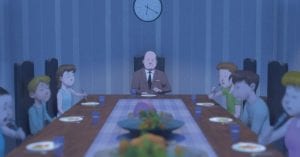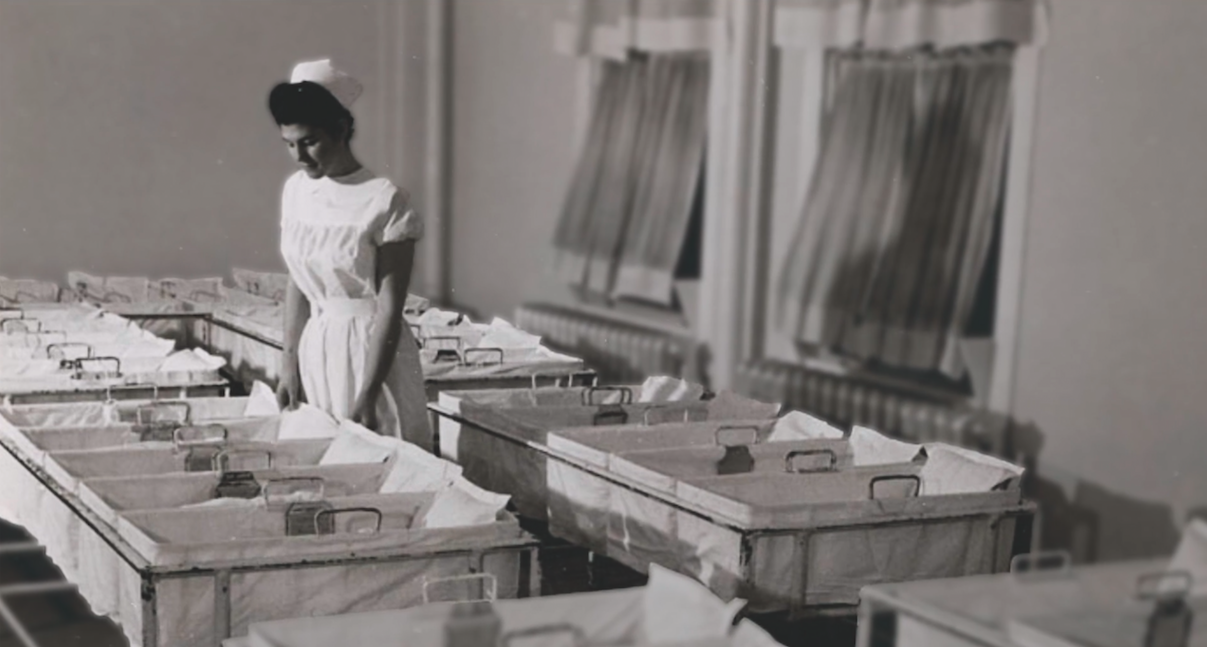Bernadette Rymer was 19 years old when she gave birth to a baby girl in 1970. Even though she was a legal adult, her autonomy was stripped away once she became pregnant. Her Catholic parents chose to bring her from Australia to British Columbia to avoid embarrassment. She spent months in a Burnaby home for unwed mothers run by The United Church of Canada before giving up her daughter for adoption — although the term “giving” in this case is questionable, since she had almost no control over the decision of whether to keep her child.
Rymer was one of hundreds of thousands of young, single pregnant women in Canada who were systematically confined and separated from their children between 1940 and 1970. Colin Scheyen’s new documentary, Mum’s the Word, tells her story through archival footage, interviews and animated vignettes. Rymer revisits the centre where she stayed during her pregnancy, offering up gut-wrenching details about her time there: how the home’s policies kept her from forming relationships with the other young women, the threats her parents made to the baby’s father so he would consent to adoption, the lies that were printed in her file about how she had no desire to take care of her baby. She speaks of how a combination of isolation, family pressure and misinformation coerced her into signing the adoption forms. She was left traumatized by the entire experience, a feeling only compounded by the fact that her family refused to ever speak of it again.
You may unsubscribe from any of our newsletters at any time.
More on Broadview: When secrets become a burden

Mum’s the Word, which can be viewed online at mumsthewordthefilm.com, is split up into six chapters that range between three and eight minutes long. Each chapter is a separate video on the website, which can make the narrative feel clunky and disjointed, and lends to the overarching frustration of experiencing the documentary: it seems raw and unfinished, like there is more to be done. Although there are a few other people interviewed in addition to Rymer — most notably the United Church’s Rev. Dan Hayward and retired senator Art Eggleton — it’s hard not to feel like, given the subject matter, the film is too brief. Even Rymer’s story, as strong as it is, could be further fleshed out.
It’s also disconcerting that the issue of the Sixties Scoop and the broader ongoing apprehension of children from racialized parents in Canada is never once mentioned. It’s possible that Scheyen didn’t feel he could properly tell that story within the scope of the film, but it seems bizarre to discuss forced and coercive adoptions without addressing this country’s legacy of colonialism and racism.
But if Mum’s the Word feels like it should be longer, it’s because the subject is so important.
It’s hard to come to grips with how many young women were subjected to such disenfranchising, controlling and downright abusive treatment. These women and the children who were taken from them have not received any apology from the state or the religious organizations that ran the “homes” where they were confined. It’s astonishing how often these stories are still hidden away, coloured by shame and stigma. One hopes that Scheyen’s work might eventually lead to a feature-length film that reaches mainstream audiences — and to a broader conversation about homes for unwed mothers and their legacy in this country.
This review first appeared in Broadview’s July/August 2020 issue with the title “Separated at birth.”
I hope you found this article from Broadview engaging. The magazine and its forerunners have been publishing continuously since 1829. We face a crisis today like no other in our 191-year history and we need your help. Would you consider a one-time gift to see us through this emergency?
We’re working hard to keep producing the print and digital versions of Broadview. We’ve adjusted our editorial plans to focus on coverage of the social, ethical and spiritual elements of the pandemic. But we can only deliver Broadview’s award-winning journalism if we can pay our bills. A single tax-receiptable gift right now is literally a lifeline.
Things will get better — we’ve overcome adversity before. But until then, we really need your help. No matter how large or small, I’m extremely grateful for your support.
Jocelyn Bell
Editor/Publisher















I was on the board of The Victor Home for Women in the mid to late 70s as a newly ordained 20-something minister. First and only woman minister. I was uncomfortable with what I saw of the residents (all really children) and of the running of the home and of a system that allowed board members to adopt directly (even though we were trying to adopt ourselves, I never even mentioned that as an option). But it was the story of a board member who was a volunteer that motivated as huge change that included hiring a wonderful social worker as director. Education and the eventual development of a residential community for new mums were two of the many resulting changes that transformed this into a ministry.